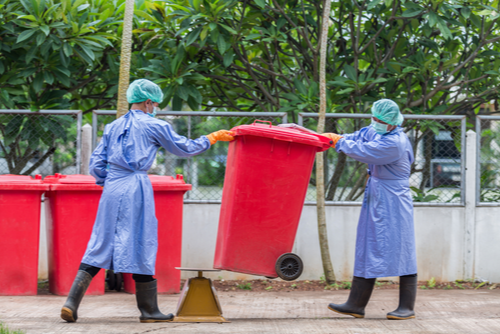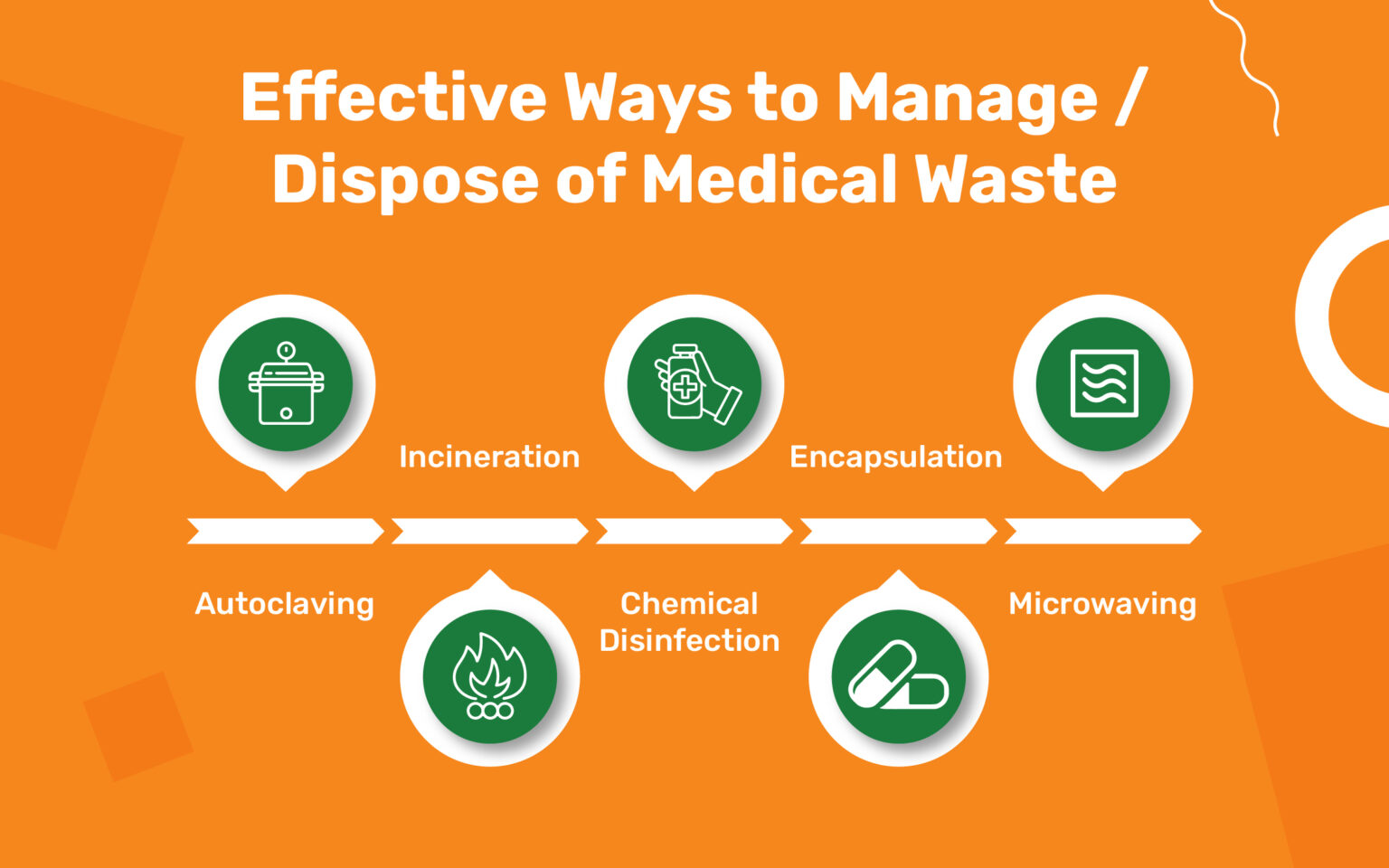Your Relied On Companion: Medical Waste Removal Services Tailored to Your Needs
Your Relied On Companion: Medical Waste Removal Services Tailored to Your Needs
Blog Article
Remain Compliant and Safe: How to Get Rid Of Medical Waste Properly
In today's ever-changing healthcare landscape, making certain conformity and safety when it comes to clinical waste disposal is of utmost significance. In this conversation, we will check out the different kinds of clinical waste, the associated threats, the lawful needs, and the ideal methods for maintaining a safe and compliant medical waste administration system.
Relevance of Correct Clinical Garbage Disposal
Appropriate clinical waste disposal is of utmost significance in making sure the security and wellness of both healthcare workers and the public. Clinical waste, which consists of things such as utilized needles, polluted dressings, and expired medications, poses major health and wellness dangers otherwise handled and taken care of properly.

Furthermore, improper disposal of clinical waste can cause ecological contamination. When medical waste is not segregated, treated, or disposed of correctly, it can locate its method into landfills or bodies of water, potentially contaminating the water, air, or dirt sources. This can have damaging impacts on environments and human health and wellness, as harmful compounds may leach into the environment or be released right into the ambience.
Kinds Of Medical Waste and Their Threats
The varied series of medical waste generated by health care centers offers numerous threats that have to be meticulously resolved to make sure appropriate disposal and avoid potential harm to public health and wellness and the environment. Clinical waste can be classified right into different classifications based on its attributes and level of threat.
One kind of medical waste is transmittable waste, that includes things that are polluted with blood or various other potentially transmittable materials. This can consist of used needles, syringes, and various other sharp objects, along with cells, swabs, and dressings from clients with contagious conditions. Inappropriate disposal of transmittable waste can bring about the transmission of unsafe pathogens and the spread of infections.
Another category is hazardous waste, which includes products that are toxic, flammable, corrosive, or reactive. This can consist of chemicals, drugs, and certain medical tools. Messing up or improper disposal of contaminated materials can cause environmental contamination and position dangers to the wellness of waste employees and the public.
Radioactive waste is one more kind of clinical waste that must be very carefully taken care of. This waste consists of products which contain radioactive compounds, such as utilized radiation treatment sources or contaminated laboratory supplies. Incorrect handling or disposal of radioactive waste can cause radiation direct exposure and significant health risks.
Lastly, non-hazardous general waste, such as paper, packaging materials, and food waste, is also generated by healthcare facilities. While this waste may not position significant dangers, it still needs to be appropriately taken care of to keep sanitation and protect against the destination of parasites.
To make certain the secure disposal of clinical waste, medical care facilities must implement proper partition, therapy, storage space, and transport approaches. This includes utilizing suitable containers, labeling, and training for personnel, in addition to conforming with regional guidelines and guidelines. By dealing with the dangers connected with different kinds of clinical waste, medical care centers can protect public health and the environment.
Governing and legal Requirements for Disposal
In order to ensure the appropriate and risk-free disposal of clinical waste, health care facilities need to follow lawful and regulative requirements. These needs are in place to secure public health and the setting from the prospective threats connected with clinical waste. Medical waste is identified as a special group of waste due to its possible to transmit contagious diseases and consist of damaging materials.

Some usual requirements include the partition and correct packaging of medical waste, using accepted containers and labels, and the application of risk-free handling and transport procedures - medical waste removal service. Health care centers might additionally be required to maintain records of their waste administration methods and provide documentation to regulatory authorities upon request
Failing to abide by these governing and legal needs can cause fines, penalties, and reputational damages for medical care centers. It is, consequently, more tips here essential for doctor to prioritize compliance and establish robust waste management protocols to ensure the proper and safe disposal of clinical waste.
Ideal Practices for Safe Medical Waste Administration
Health care facilities should abide by industry best practices to ensure the efficient and risk-free management of medical waste - medical waste disposal services with WasteX. Executing these ideal methods not just assists secure the setting and public wellness however likewise minimizes the threat of prospective legal and economic repercussions
One of the vital ideal techniques is the appropriate partition and containment of various kinds of medical waste. This entails using color-coded containers and clearly classifying them to guarantee that each kind of waste is gotten rid of appropriately. Additionally, health care centers should have assigned locations for storage space and disposal of medical waste, with clear guidelines and treatments in area.
Another essential aspect of risk-free clinical waste monitoring is the training and education of health care personnel. All employees that handle medical waste must obtain thorough training on the proper handling, storage, and disposal procedures. It is critical to ensure that employee know the possible threats linked with clinical waste and are equipped with the required understanding and abilities to manage it securely.
Normal surveillance and bookkeeping of waste management practices is also important. This includes on a regular basis assessing waste monitoring treatments, performing examinations, and keeping exact documents. By monitoring waste monitoring techniques, medical care centers can determine any type of prospective issues or areas for improvement and take corrective activities as necessary.
Last but not least, health care facilities ought to prioritize the use of environmentally pleasant disposal techniques whenever possible. This includes utilizing waste therapy innovations such as autoclaving or incineration, which can help in reducing the volume and unsafe nature of clinical waste.
Eco-Friendly Solutions for Medical Waste Disposal
Executing eco-friendly solutions for clinical garbage disposal is essential for healthcare facilities to minimize ecological effect and guarantee lasting methods. Traditional approaches of clinical waste disposal, such as incineration and landfilling, have actually been discovered to release dangerous contaminants into the air and pollute soil and water resources. Therefore, there is an expanding demand for alternative approaches that are both ecologically friendly and secure.
One green service is the application informative post of on-site waste treatment systems. These systems make use of sophisticated technologies to securely process medical waste within the health care facility itself. By treating the waste on-site, transport emissions and risks connected with off-site disposal are reduced. Furthermore, these systems frequently utilize innovative sterilization methods, such as vapor or microwave treatment, to make sure the full destruction of contagious microorganisms.
An additional eco-friendly method is the fostering of reusing programs for particular kinds of medical waste. Materials such as glass, plastics, and metals can be recycled as opposed to disposed of in garbage dumps. By carrying out partition and reusing programs, medical care centers can significantly decrease their waste volume and reduce their environmental footprint.
Moreover, health care centers can discover using reusable medical equipment and supplies. By choosing recyclable things, as opposed to single-use choices, the quantity of waste created is dramatically reduced. Reusable items can be sterilized and utilized several times, resulting in cost financial savings and much less ecological effect.
Final Thought
In conclusion, correct disposal of medical waste is critical for preserving compliance and making certain safety. Adhering to best practices for risk-free medical waste administration and exploring environment-friendly services can contribute to a liable and sustainable method to squander disposal in the healthcare sector.
In this discussion, we will certainly explore the different kinds of medical waste, the connected threats, the legal demands, and the ideal practices for maintaining a risk-free and certified medical waste monitoring system - medical waste removal near me.One kind of medical waste is infectious waste, which includes products that are infected with blood or various other possibly infectious materials.Radioactive waste is one more kind of clinical waste that have to be very carefully taken care of. Clinical waste is classified as a special category of waste due to its prospective to transfer contagious illness and consist of harmful compounds
Following ideal techniques for secure clinical waste monitoring and discovering environmentally friendly services can contribute to a responsible and lasting strategy to throw away disposal in the medical care sector. medical waste disposal services with WasteX.
Report this page